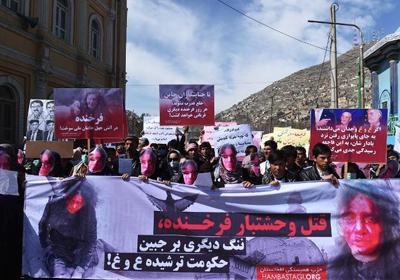As she begged for her life, Farkhunda's vicious death took hours. Precipitated by false accusations, the 27-year-old pleaded to the hundreds of men and women who were intent on punishing her. Her pleas were not met with mercy, but with fatal weapons of choice; planks, rocks, and sticks. After a cruel and brutal beating at the hands of dozens of men outside a mosque in the heart of Afghanistan's capital, last week, Farkhunda was eventually dragged through the streets by the mob, thrown off a bridge, and, presumably still alive, set ablaze. Her assailants left her charred remains left on the bed of the dry Kabul River.
Dozens of bystanders cowardly looked on, recording the horrific event and eagerly made it immediately available on social media. Some bragged about their footage. Very few, a handful of people, briefly tried to protect Farkhunda, but failed miserably.
This "heinous attack," as categorized by President Ashraf Ghani, and how the murder of Farkhunda is handled is a defining moment. Many across the globe have valiantly demanded justice for Farkhunda, but very few have talked about the specific legalities of it all.
Let's review. It is an undisputed fact that Farkhunda was murdered. It is an equally undisputed that many witnessed this heinous attack doing nothing to stop it; they too should be held equally responsible for their failure to act.
How this case is prosecuted will show the world what Afghanistan has become, and what benefits and changes have been the legacy of billions of dollars investment and 13 year international intervention that came to an end this year.
After Ghani's fruitful three-day trip to the Whitehouse, President Obama announced a commitment to maintain a 9800 troop presence in Afghanistan President Ghani, amid thunderous applause in Congress on 25 March 2015,promised to work towards a commitment to woman's rights, a transformation of the legal system, and a pledge to defeat terrorism. All of this will now be put to the test as it is determined how Farkhunda's murder is handled by the Afghan legal system.
This is more than a community policing issue, it is a societal issue, a global issue, which goes to the core of how a disenfranchised public continues to silently support through their inaction the repeated degradation and demise of more than half of Afghanistan's females who consistently remain unheard, victimized, and shut down. By penalizing those who were passive onlookers Afghanistan can be a frontrunner in pointing out the responsibility that we have to each other and it can be a means of setting a global precedent. It can be an example to show how a vigilant public, working under the guise of community policing has an affirmative moral and legal duty to prevent such wild attacks in the future.
The reality is that hundreds of people cowardly watched as Farkhunda was brutally murdered. The equally important reality is that this is a global problem where guilty bystanders are not held accountable for their inaction. Afghan law, the International Conventions to which Afghanistan is a signatory to, as well as common human decency requires that those who participated in Farkhunda's murder must be punished, as must those who stood idly by and watched.
According to Afghanistan's Penal Code Article 354, a person has an affirmative legal duty to render assistance to someone being victimized, like Farkhunda so clearly was, failure to do so mandates criminal punishment.
Punishing the voyeuristic onlookers is key. It is key for Afghanistan, it is key in setting precedent in the Middle East, and it is key for the world. In a country that, as a 2012 Oxfam report noted, 87% of woman are victims of some form of physical, sexual, or psychological violence or forced marriage in their lifetimes, punishing perpetrators and the equally guilty onlookers sends a societal message that every Afghan is accountable to the protection of its women.
It is vital that the Afghan Government reaffirms, recognizes, and acknowledges that the community has certain responsibilities to protect its citizens. Allowing society to ignore its obligation only promotes anarchy, discord, and perpetuates further violence. It is imperative that the government punishes not only those who tortured Farkhunda to death, but also those who did nothing, so it deters anyone from refusing to render assistance in the future.
It is important that Afghanistan's new government not sweep what happened to Farkhunda under the rug and not support, passively or actively, the deeply rooted culture of misogyny that has permeated so much of Afghanistan's social fabric. After billions of dollars invested and thousands of lives lost, Afghanistan must decide who they are.
Millions of Afghan citizens like Farkhunda deserve a country that respects their rights and protects their safety; one which holds up moral and legal codes that will punish those who seek to attack them as well as the cowards who do nothing.
This is a defining moment Afghanistan. In 2005 at TED GLOBAL, then Minister of Finance and now President Ghani said, very astutely that "We must now finally come to think about the premises of a truly global world, in relationship to the regime of rights and responsibilities and accountabilities that are truly global in scope." Farkhunda and how her legacy is treated is a defining moment for Afghanistan. It is a defining moment for the world. Afghanistan will you passively sit back and watch as your citizens, your women, are viciously killed or will you take a stand and forge a new global path of accountability and responsibility by punishing those that were directly and indirectly responsible for her demise.



Comment this post